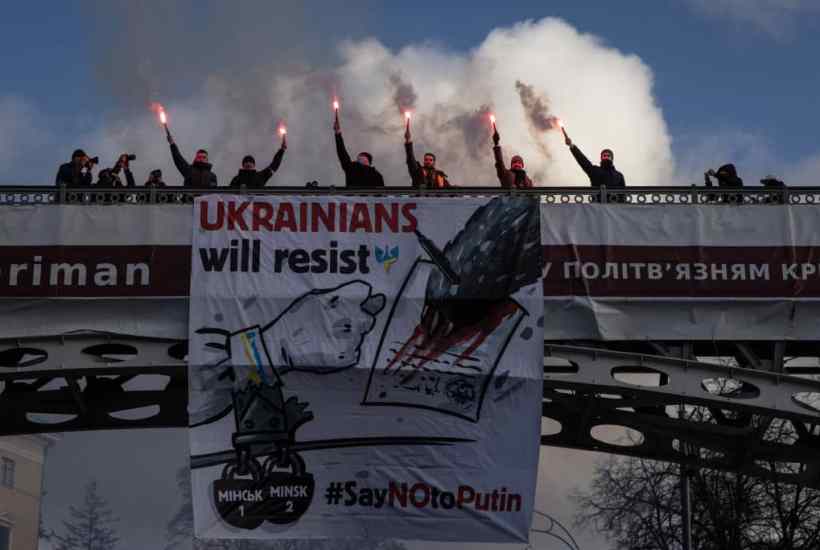Following his fateful decision to invade Ukraine, Russia’s dictator Vladimir Putin has been customarily described as a high-stakes gambler. Yet the embarrassing underperformance of the Russian military in Ukraine and the bite of Western sanctions suggest that Putin is no genius mastermind strategist but a risk taker who has bitten off more than he can chew.
As yesterday’s series of summits in Brussels – Nato, EU, and G7 – is showing, the West has also made a dangerous gamble of its own: expecting that it can stay out of the war and also get the outcome that we all want, namely a decisive Russian defeat and a downfall of Putin’s regime.
The current strategy, in other words, is to let Ukrainians fight and bleed – while providing them with some forms of military and other aid, but not with others – and hoping that Russia will bleed faster. Hence the explicit ruling out of any Nato military presence in Ukraine by both the Biden administration and by the German government and the Western ‘self-deterrence’ of moves that could be perceived by the Kremlin as overly provocative, such as the delivery of Soviet-made fighter jets to Ukraine, blocked by the Pentagon.
The West’s bet might very well work out. Relative to the initial expectation of Russian forces’ overrunning Ukraine and turning it into a Russian satrapy in days, the bravery and determination of Ukrainians along with their sheer competence on the battlefield is an extraordinary success story that will surely be noted by history books of the future. As a result, military analysts point out the Russian campaign has now ‘culminated’, creating an unsatisfying ‘stalemate’, which is hard for either side to reverse.
However, this is not a time for self-congratulation. A ‘stalemate’ does not mean the end of the conflict. More likely, it means a long war of attrition, in which the rest of Ukraine is slowly reduced – as Mariupol and Kharkiv have already been – to rubble, and in which increased Russian brutality towards civilians acts as a substitute for tactical advances.
The bet that the West has made falls short of the rhetorical displays of solidarity with Ukraine. And because the war of self-defence that the Ukrainians are waging is, to a certain extent, our war too, making Ukrainians carry its burden in our stead means foregoing control over how and when it ends and how the war’s end might shape Europe’s security.
Doing our utmost to stay out of the conflict while cheering Zelenskyy’s government from the sidelines means that we lose the right to complain about future decisions that Zelenskyy makes. For now, Ukrainians are fighting back with unseen tenacity. Simultaneously, however, Zelenskyy is signalling his willingness to negotiate with Putin, even though the Kremlin’s diplomatic efforts are conducted in visibly bad faith.
It is perfectly imaginable that, in order to stop civilian deaths and suffering at the hands of Russian invaders, the Ukrainian leadership will make territorial concessions or renounce its ambitions, enshrined in the constitution, to join the EU and Nato. If that happens, the West will have no option but to defer to the Ukrainians’ choices, even if those might be damaging to Europe’s security over the longer term and even if those might embolden Putin in the future. At that stage, to appear as constructive actors, the United States, the EU and the UK might even offer Russia a limited form of sanctions relief.
Yet Ukraine’s formal recognition of Russia’s takeover of Crimea and of the self-styled ‘people’s republics’ of Luhansk and Donetsk would mean that illegal land grabs are permissible insofar as they are backed by force. The same for ambitions of revanchist powers to determine foreign and security policies of their weaker neighbours. The lesson for Putin and for would-be Putins of the future, in short, will not be that brazen gambles are dangerous; rather, that they must be pursued brutally and ruthlessly.
Focus on the day-to-day reality of Russia’s stalled invasion risks making us oblivious to the big picture. In 2014, too, Russian ambitions in the Donbas went beyond the narrow sliver of territory that Moscow-sponsored separatists were able to control. But neither those difficulties nor Western sanctions dissuaded Putin from trying again – quite the contrary.
Today, the idea of a ‘post-Suez’ Russia, chastened by its military setbacks in Ukraine and crippling effects of Western sanctions, is an attractive one. Yet we might come to regret believing it and using it as a pretext to double down on our bet that Ukraine alone, without us, can bring Russia’s invasion to a satisfactory conclusion.
Got something to add? Join the discussion and comment below.
Get 10 issues for just $10
Subscribe to The Spectator Australia today for the next 10 magazine issues, plus full online access, for just $10.



















Comments
Don't miss out
Join the conversation with other Spectator Australia readers. Subscribe to leave a comment.
SUBSCRIBEAlready a subscriber? Log in